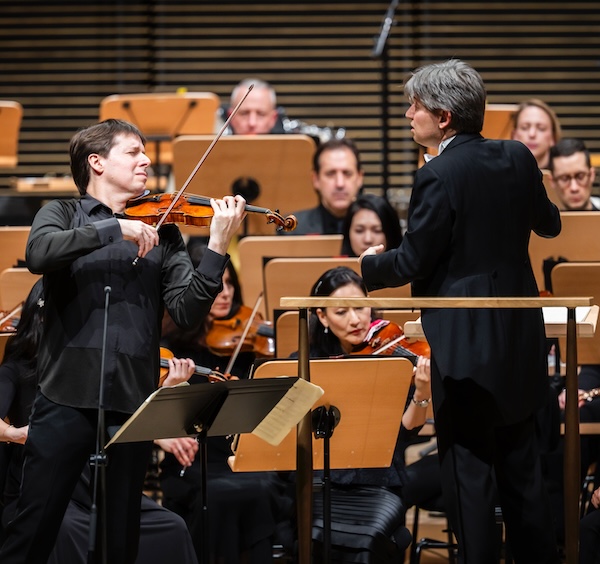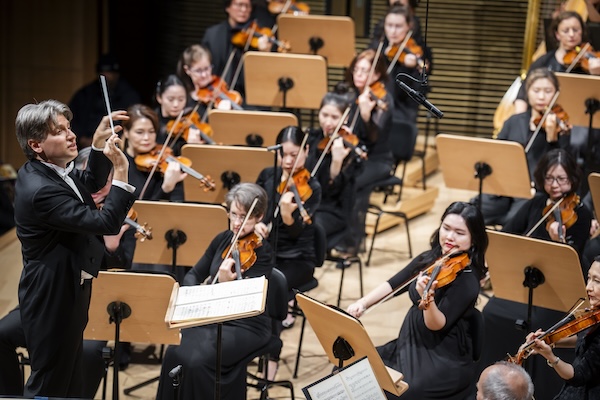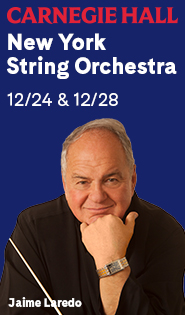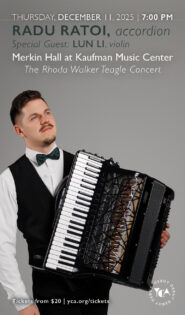A romantic program finds its footing with Bell, Philharmonic

The New York Philharmonic continued its new year Wednesday night with a fresh face and some familiar pleasures.
Leading the orchestra for this week’s subscription program is Daniele Rustioni, making his debut with the orchestra—though he’s already familiar to patrons of the Metropolitan Opera, where he was named principal guest conductor in November. He was joined by violinist Joshua Bell, always a favorite, and, judging by the number of empty seats after intermission, the main draw for many in the house.
Those listeners heard him play Dvořák’s Violin Concerto, but missed Tchaikovsky’s Symphony No. 4 on the second half. Opening with Mario Castelnuovo-Tedesco’s Overture to The Merchant of Venice, this was an evening of romantic drama and storytelling.
Each of the three pieces could be heard as separate elements of a long, complex story—musical journeys that pass through various trials but successfully return home. But some of the performances leaned toward the overly episodic, intentionally and not, put an occasional crimp into the overall experience.
Castelnuovo-Tedesco is mainly known today for his guitar and piano music, but he was also a leading Hollywood film composer, with around 200 scores to his credit after he left Fascist Italy for America. He also wrote a series of concert overtures for Shakespeare plays (and two operas setting the playwright), pieces in which he distilled his own musical dramas to express what he found in the plays.
The Merchant of Venice is a superb example of both his conception and craft and the overtures performance was a complete success. The music is both pictorial and fluid, clearly establishing moods, staying with them just long enough, then moving elegantly to the next. The harmonic and orchestral details are finely etched, and there was a palpable sensation of both empathy and tragedy in the overall form. The orchestra’s performance sounded expert, exuding confidence, precision, and command.

Those qualities were less consistent in the remainder of the concert, in conception and execution. Like Gil Shaham and the Czech Philharmonic’s performance of the same Dvořák concerto last month, this one also took awhile to come together.
Bell was excellent from the first notes, his exquisite tone pushing out enormous energy, expression, and forward drive. He knew exactly where he wanted to go and what he wanted to say, and his playing was full of excitement. Soloist and orchestra were synchronized in time, but the vibes were offset from each other, with the Philharmonic sounding subdued next to Bell’s exuberance.
Perhaps inspired by the violinist, the orchestra gradually rose to meet him during the Adagio movement. This happened measure by measure, a group sense of purpose coming together and then fully meeting in the Finale, which had fine pace and agility, an energy not just of strength but quickness. While not a complete performance, this was a solid conclusion, and Bell rewarded his fans with a lovely encore of an arrangement of a Chopin Nocturne played as a duo with harpist Nancy Allen.
There was plenty of verve in the Tchaikovsky, but a choppy view of the form from Rustioni. After an imposing and strong opening “fate” theme, with a rich sound from the low brass, Rustioni marked off the different sections of the first moment in a block-by-block approach. This music flows as well as Castelnuovo-Tedesco’s overture, but the conductor seemed to see it as a challenging construction project rather than as a finished whole.
Each block reached a high point, especially the quirky secondary melody in the winds, but eschewing flow meant it also took a little time to get each one going. As with the violin concerto, this start-stop-start approach gradually melted away as the movements passed, as Tchaikovsky’s suavity, especially in the gorgeous Andantino, overwhelmed any interventions.
Rustioni’s insistence on showing solid dividing lines between sections gave the Scherzo was a liveliness and unexpected rustic charm, as if the winds were the slightly bumbling cousins of the strings. The Finale was fabulous, with stupendous energy and a thrilling feeling from the orchestra as they brought back the material from the previous movements and delighted in showing how fate both fit together and could be thwarted.
This program will be repeated 7:30 p.m. Thursday and Saturday. nyphil.org


